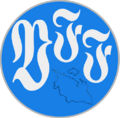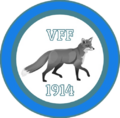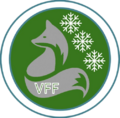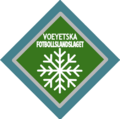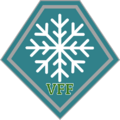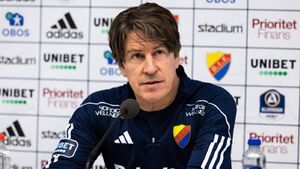Vœyetska national football team
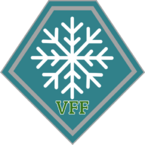 | |||
| Nickname(s) | Räven (Foxes) Snöflingor (Snowflakes) | ||
|---|---|---|---|
| Association | Vœyetska Fotbollförbundet (VFF) | ||
| Confederation | EFA (Euronia) | ||
| Sub-confederation | EEFA (East Euronia) | ||
| Head coach | Lars Olqvist | ||
| Captain | Finnian Bjorkstrand | ||
| Most caps | Andreas Hjortshøj (167) | ||
| Top scorer | Fríðálvur Atli Sævarsson (75) | ||
| Home stadium | Friendship Arena | ||
| |||
| First international | |||
(Veskallås, Vœyetska; 1914) | |||
| Biggest win | |||
(Sarding, Vœyetska; 29 May 1972) | |||
| Biggest defeat | |||
(Allengin, Elbresia; 12 June 1990) | |||
| World Cup | |||
| Appearances | 25 (first in 1977 (Group of 32)) | ||
| Best result | Champions (2024) Runner-ups (1991, 1999, 2002, 2008) | ||
| Website | vnft.vy | ||
The Vœyetska national football team (Swedish: Voeyetska fotbollslandslaget) represents Vœyetska in men's international football and it is controlled by the Vœyetska Fotbollförbundet, the governing body of football in Vœyetska. Vœyetska's home ground is Friendship Arena in Sjédal which is the largest stadium in Vœyetska. The team has been coached by former national team player Lars Olqvist since 2016. The current roster is believed by many to be part of the golden age of Vœyetskan football.
Vœyetska has qualified for 25 World Cups, their first being the 1977 tournament. Vœyetska were the champions of the 2024 World Cup. Vœyetska were also the runner-ups in the 1991, 1999, 2002, and 2008 tournaments. The team's successes in international competitions have them ranked among the top 7 teams in Euronia. Other accomplishments of the Vœyetska team include a 7-0 Group of 32 victory over West Chanchajilla in the 1988 tournament, and they were part of the highest-ever scoring World Cup final in a 7-4 loss to Versenia in 1991. Vœyetska hosted the 1989 World Cup, with the main location being Ídolfsvinn.
Vœyetska has also been a prominent side in additional continental tournaments, most notably the EFC Nations League, in which they have performed well among other Euronian nations.
History
-lil bit of a recap here
Founding
-introduces my boy Johnny Haaland
-who liked football a lot so he tried to get everyone to like football a lot
-started soliciting
-everyone sed go away
-Johnny got mad
-so he founded voeyetska's own little academy
-got a bit more popular
Early days
-Johnny decides to be head coach
-for his team which is pretty much the best voeyetskan players he could find
-and they play against small colleges and stuff
-win most of them cuz theyre all stars
-but no one ever likes the team that always wins so now theyve got a lot of haters
Founding of the VFF
-VFF is founded
-and theyre like: yo Haaland, wanna join us
-Haalands like: bet
- Vœyetska 4–2 Drambenburg
(Veskallås, Vœyetska; 1914)
-holy cow they won
-people pay a little bit more attention
-but not enough for Johnny
-Johnny rage quits
-Henrik Poulsson takes over til '17
-then Jörgen Raanta til '20
-then Sven Hedenskog til '24
-and a bunch more coaches because everyone keeps getting assassinated (jk)
-keeps playing ok in friendlies
Post-war era
-war happens
-good players died :(
-but that happened to a lot of countries, so voeyetska's good, right?
-no
-theyre terrible
-but it doesnt really matter cuz theyre just playing friendlies and stuff
World Cup era
-sike
-it matters
-do bad for the most part
-buuuuuuuuuut not all the world cups say stuff yet
-so just say they performed not that good
-host a wc
-been decent since 2000
-but not that good the past decade
Team Image
Supporters
Rivalry
Kit
In the early days of the Vœyetska national football team, Joseph Haaland, the older brother of the manager Johnny Haaland, was put in charge of acquiring and supplying the kits of the team. Joseph was instructed to find teal or green kits. He was also directed to not get white because the majority of teams at the time wore white and it could possibly cause confusion for the team's players. While he was on his mission to find a manufacturer and distributor, Joseph came to realize that almost none of the major material provided for a price within the budget. Jospeh wrote a letter to Johnny regarding the situation. Johnny wrote back that sky blue would be the best option available. It was unique, affordable, and visually satisfying. Since then, nearly all of the national team's first kits have been sky blue, and the second kits have consistently been green.
Kit History
First and Second color kits.
- First
|
2002-2004
|
2004–2008
|
2008–2011
|
2011–2015
|
2015–2019
|
2019–2022
|
2022–
|
- Second
2002–2004
|
2004-2008
|
2008-2011
|
2011-2015
|
2015–2019
|
2019–2022
|
2022-
|
Kit Sponsorship
Since 2015 Red Elk, a Vœyetskan sports apparel company that has been rapidly increasing in popularity and sales, has manufactured the Vœyetska national team's kits. Prior to that they were made by IK3 from 2004 to 2015. In 2002 to 2004 the uniforms were made by Poullos but quickly shifted to IK3 because the players complained that the kits were too heavy especially while playing in the rain or moist conditions. From 1973 to 2002 Grönner, Inc. was responsible for the kits.
| Kit supplier | Period |
|---|---|
| 1973–2002 | |
| 2002–2004 | |
| 2004–2015 | |
| 2015–present |
Badge
The Vœyetska national football team has had seven different badges over the course of their 108 year history.
The first ever club badge was designed by the co-founder of the national team, Hallfred Lindstedt. The logo features the letters "VFF" in old english font on a light blue color circle, the traditional color of the team's home kits. The circle has a gray outline solely added for visual purposes. It also displays the borders of Vœyetska representing the country as none of the flag's colors are a part of the logo. The logo was used until 1937 when the Selection Committee decided to alter the logo to something considered more "modern".
In 1938 the design team decided on a black shield logo with a gray outline, five snowflakes representing the five provinces, the letters "VFF" for the Swedish spelling of "Vœyetska national football team", and the year 1914 acknowledging the founding of the team. Originally, the logo was not liked by most fans as they wanted something more "patriotic" especially after ditching their last logo. However, the Committee did not make any further actions regarding the badge and the logo slowly became accepted.
In 1961 the majority of the Selection Committee determined the badge needed to be redone after being international confused for other team's logos. For the first time in history, the Committee issued a design contest. The winning design was submitted by 22 year old Miranda Cederschiöld with about 2,139,000 votes. The logo showed the national animal, the melanistic Vœyetskan fox, also known as the silver fox. The logo's inner circle is white with a teal border. The outer circle utilizes the traditional light blue with a traditional teal outline.
The 1961 redesign was well-liked but still did not contain very much of Vœyetska's national identity. In 1981 another design contest was held. The winning logo consisted of a Vœyetskan fox with the letters "VFF" for the Voeyetska fotbollslandslaget. In the upper right hand section of the logo are three snowflakes representing Vœyetska's cold environment. The foundation of the crest is a green circle with white and teal outlines.
The national team's new head coach Elliot Lauridsson despised the old logo, saying, "The fox looks possessed and the snowflakes seem out of place." Elliot Lauridsson headed a new logo design project, and in the end the team, but mostly Elliot Lauridsson, concluded they had put together a very complete logo. That logo features a teal octagon base with a white decagon on top of that with the standard snowflake. However, this logo was hated by Vœyetskans as well as people around the world. Lauridsson once said in an interview, "This is our best work yet, we have our national colors, a neat and clean design, and uniqueness." Even though the fans hated the logo, Lauridsson made sure it would stay in place. After a horrid World Cup in 1999, Elliot Lauridsson was sacked, and the team abandoned the badge.
As soon as Nicolai Østigård assumed the role of head coach, one of his major priorities was to select a logo that would be appreciated by the fans. His new logo was created with simplicity and patriotism in mind. The logo features a tilted green square with a gray border surrounded by teal. In the middle of the square are the words, "Voeyetska fotbollslandslaget". Below the text is a large white snowflake to represent the team.
2008 saw the final change to the Vœyetska national football team logo to date. With hopes of modernizing the old logo, the next logo displays a teal pentagon with two gray borders. In the middle is a snowflake larger than the previous one. Below that are the abbreviated letters "VFF" for "Voeyetska fotbollslandslaget". The logo was approved by the board on 6 March 2008 and revealed to the public exactly one month later. The logo has been well liked by fans. As such, it has lasted well over a decade.
Home stadium
The Vœyetska national football team has played their home games at Friendship Arena in Sjédal since 2007 replacing the old Idrotaasparken which was recently destroyed. The national team shares Friendship Arena with the Vœyetska league giants AIF Sjédal. Friendship Arena is the largest arena in all of Vœyetska with a capacity of 80,000. The Idrotaasparken was considered too small for the growing team and the stadium itself was showing signs of deterioration. It is rumored that Friendship Arena will be the main city in Vœyetska's bid to host the 2024 World Cup.
Construction for Friendship Arena began in 2001 and took until 2007 when the arena was finally suitable for the national team. AIF Sjédal moved into the building and have played their home games there since 2010 when the Idrotaasparken was destroyed.
Results and fixtures
2023
| 31 March 2023 World Cup | Vœyetska | 2–2 | Helmfurt, Besmenia | |
| 18:45 | Report |
|
Stadium: Rainer-Spindler-Stadion Attendance: 40,886 Referee: Gonzalo Pérez |
| 1 April 2023 World Cup | Vœyetska | 0–1 | Laitstadt, Besmenia | |
| 18:45 | Report |
|
Stadium: Laitstadt Olympic Stadium Attendance: 70,141 Referee: Heinz-Johann Schwartz |
| 4 April 2023 World Cup | Vœyetska | 2–1 | Freiz, Besmenia | |
| 20:00 |
|
Report |
|
Stadium: Sümmingenstadion Attendance: 40,938 Referee: Bennett Walker |
| 7 May 2023 Friendly | Greater Normark | 2–3 | Oskarsviik, Greater Normark | |
| 12:00 |
|
Report |
|
Stadium: Oskarsviik Stadion Attendance: 33,983 Referee: Thomas Atkinson |
| 10 May 2023 Friendly | Zamastan | 4–2 | Arinals, Zamastan | |
| 13:30 | Report | Stadium: Shore Crew Stadium Attendance: 49,298 Referee: Benevius Daneyko |
| 27 May 2023 Friendly | Vœyetska | 2–0 | Sjédal, Vœyetska | |
| 12:00 |
|
Report | Stadium: Friendship Arena Attendance: 16,948 Referee: Casdae Ensuvotta |
2024
| 19 March 2024 World Cup | Vœyetska | 2–2 | Kaajoki, Caspiaa | |
| 12:00 |
|
Report |
|
Stadium: Sandnessjoen Stadium Attendance: 54,210 Referee: Joël Lajoie |
| 24 March 2024 World Cup | Vœyetska | 5–1 | Viitaniemi, Caspiaa | |
| 14:00 |
|
Report |
|
Stadium: Arena Fedmund Attendance: 56,871 Referee: Davit Jandieri |
Coaching staff
As of 4 April 2023
|
Manager history
- Head coaches
- 1914 Johnny Haaland
- 1915–1917 Henrik Poulsson
- 1918-1920 Jörgen Raanta
- 1921–1924 Sven Hedenskog
- 1925–1926 Erik von der Leyen
- 1927 Frank Malin
- 1928–1933 Gisle Härma
- 1934–1936 Norman Nilsson
- 1937 Rudolph Ask
- 1938–1942 Aulis Bauer
- 1943–1944 Snorre Xaviersson
- 1945–1949 Aldy Lindell
- 1950 Hektor Klingberg
- 1951–1961 Elvin Kolmar
- 1962–1965 Steffen Mark
- 1966–1969 Antonio Leitner
- 1970–1977 Eddie Forssell
- 1978 Bruno Sjökvist
- 1979–1991 Jouko Koivula
- 1992–1994 Linus Spelling
- 1995–1999 Elliot Lauridsson
- 1999–2006 Nicolai Østigård
- 2007–2016 Mattias Haula
- 2016– Lars Olqvist
Players
Current squad
Caps and goals are correct as of 24 March 2024, after the match against Syraranto.
Player records
Most capped players
Top goalscorers
Notable captains
Competitive record
World Cup
| Year | Round | Pld | W | D | L | GF | GA | Top scorer |
|---|---|---|---|---|---|---|---|---|
| Did not qualify | ||||||||
| Did not qualify | ||||||||
| Did not qualify | ||||||||
| Did not qualify | ||||||||
| Round of 32 | 1 | 0 | 0 | 1 | 2 | 2 | Spjälle Vestermark (1) Rolf Lindblad (1) | |
| Round of 32 | 1 | 0 | 0 | 1 | 1 | 4 | Arfast Forsman (1) | |
| Did not qualify | ||||||||
| Quarter-finals | 3 | 2 | 0 | 1 | 4 | 2 | Toby Odegaard (2) | |
| Did not qualify | ||||||||
| Did not qualify | ||||||||
| Round of 16 | 2 | 1 | 0 | 1 | 4 | 3 | Einari Rautiainen (2) | |
| Round of 16 | 2 | 1 | 0 | 1 | 5 | 3 | Sven Afzelius (2) | |
| Did not qualify | ||||||||
| Round of 16 | 2 | 1 | 0 | 1 | 3 | 3 | Mads Lerche (3) | |
| Round of 32 | 1 | 0 | 0 | 1 | 0 | 2 | None | |
| Quarter-finals | 3 | 2 | 0 | 1 | 14 | 7 | Hosea Kiærskou (5) | |
| Quarter-finals | 3 | 2 | 0 | 1 | 5 | 4 | Hosea Kiærskou (2) Fríðálvur Atli Sævarsson (2) | |
| Did not qualify | ||||||||
| Runners-up | 5 | 4 | 0 | 1 | 16 | 14 | Fríðálvur Atli Sævarsson (9) | |
| Did not qualify | ||||||||
| Quarter-finals | 3 | 2 | 0 | 1 | 4 | 2 | George Mörner (2) | |
| Round of 16 | 2 | 1 | 0 | 1 | 4 | 1 | Eddie Hovet (2) | |
| Did not qualify | ||||||||
| Did not qualify | ||||||||
| Did not qualify | ||||||||
| Quarter-finals | 3 | 2 | 0 | 1 | 3 | 2 | Fríðálvur Atli Sævarsson (1) Isak Meloy (1) Eddie Hovet (1) | |
| Runners-up | 5 | 4 | 0 | 1 | 16 | 11 | Fríðálvur Atli Sævarsson (7) | |
| Did not qualify | ||||||||
| Did not qualify | ||||||||
| Runners-up | 5 | 4 | 0 | 1 | 13 | 4 | Fríðálvur Atli Sævarsson (7) | |
| Did not qualify | ||||||||
| Did not qualify | ||||||||
| Did not qualify | ||||||||
| Did not qualify | ||||||||
| Fourth place | 5 | 3 | 0 | 2 | 10 | 11 | Emerik Kovačić (5) | |
| Runners-up | 5 | 4 | 0 | 1 | 11 | 4 | Andreas Hjortshøj (8) | |
| Round of 16 | 2 | 1 | 0 | 1 | 3 | 4 | Andreas Hjortshøj (3) | |
| Quarter-finals | 3 | 2 | 0 | 1 | 8 | 3 | Elvin Borseth (2) | |
| Quarter-finals | 3 | 2 | 0 | 1 | 10 | 11 | River Sandstrom (4) | |
| Quarter-finals | 2 | 2 | 0 | 1 | 6 | 4 | Roope Aho (3) | |
| Round of 32 | 1 | 0 | 0 | 1 | 1 | 2 | Emerik Kovačić (1) | |
| Did not qualify | ||||||||
| Quarter-finals | 3 | 2 | 0 | 1 | 4 | 2 | Trond Meloy (2) | |
| Round of 16 | 2 | 1 | 0 | 1 | 3 | 2 | Trausta Freyrsson (2) | |
| Did not qualify | ||||||||
| Quarter-finals | 3 | 2 | 0 | 1 | 9 | 4 | Emerik Kovačić (4) | |
| Did not qualify | ||||||||
| Did not qualify | ||||||||
| Did not qualify | ||||||||
| Did not qualify | ||||||||
| Did not qualify | ||||||||
| Winners | 5 | 5 | 0 | 0 | 10 | 8 | Aron Hjalmarsson (8) | |
EFC Nations League
Head-to-head record
Honours
Major titles
Minor titles
See also
Refrences
External links
- Drambenburg
- Zamastan
- Infobox medal templates requiring repair
- Pages using football kit with incorrect pattern parameters
- Vœyetska
- Greater Normark
- Sateroc
- Zoygaria
- Syraranto
- Alterrame
- Chanchajilla
- Timeria
- Beleroskov
- Ossotia
- Coalition of Crown Albatross
- Vuswistan
- Candatora
- Artegana
- Albarine
- Quetana
- Gladysynthia
- Alcarres
- Elbresia
- Saint Offeat
- Mulfulira
- Somodi
- New Anea
- Caspia
- Haduastan
- Lutharia
- Cadair
- Utobania
- Avergnon
- Elborra
- Allieu
- Skith
- Yuan
- Vulkaria
- Emmiria
- Sulifa
- Kossmil
- Sports (Coalition of Crown Albatross)
